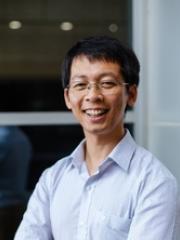Dr Quan Nguyen

Researcher biography
Dr Quan Nguyen is a Group Leader at the Institute for Molecular Bioscience (IMB), The University of Queensland. He is leading the Genomics and Machine Learning (GML) lab to study neuroinflammation and cancer-immune cells at single-cell resolution and within spatial morphological tissue context. His research interest is about revealing gene and cell regulators that determine the states of the complex cancer and neuronal ecosystems. Particularly, he is interested in quantifying cellular diversity and the dynamics of cell-cell interactions within the tissues to find ways to improve cancer diagnosis or cell-type specific treatments or the immunoinflammation responses that cause neuronal disease.
Using machine learning and genomic approaches, his group are integrating single-cell spatiotemporal sequencing data with tissue imaging data to find causal links between cellular genotypes, tissue microenvironment, and disease phenotypes. GML lab is also developing experimental technologies that enable large-scale profiling of spatial gene and protein expression (spatial omics) in a range of cancer tissues (focusing on brain and skin cancer) and in mouse brain and spinal cord.
Dr Quan Nguyen completed a PhD in Bioengineering at the University of Queensland in 2013, postdoctoral training in Bioinformatics at RIKEN institute in Japan in 2015, a CSIRO Office of Chief Executive (OCE) Research Fellowship in 2016, an IMB Fellow in 2018, an Australian Research Council DECRA fellowship (2019-2021), and is currently a National Health and Medical Research Council leadership fellow (EL2). He has published in top-tier journals, including Cell, Cell Stem Cell, Nature Methods, Nature Protocols, Nature Communications, Genome Research, Genome Biology and a prize-winning paper in GigaScience. In the past three years, he has contributed to the development of x8 open-source software, x2 web applications, and x4 databases for analysis of single-cell data and spatial transcriptomics. He is looking for enthusiastic research students and research staff to join his group.
